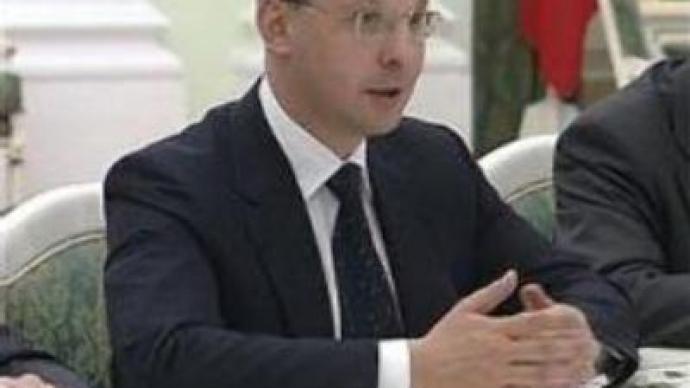Russia & Bulgaria aim to strengthen economic ties

Trade partnership is thriving between Russia and Bulgaria, but the countries' aim at making the ties even stronger. Ways of diversification links in the energy sector and other areas have been discussed by the Russian President and Bulgarian PM.
This has been the second meeting of Vladimir Putin and Sergey Stanishev in as many months – a sign of healthy relations.For centuries close cultural ties have given the two countries a strong bilateral foundation and now a growing economic partnership is making Russo-Bulgarian relations even stronger.Trade between the two grew by a massive 55% in 2006, with Russia rating Bulgaria's second largest partner and largest exporter.Oil, gas and equipment for atomic power stations make 90% of Russian export to Bulgaria. Energy is where trade relations are closest. Russian President and Bulgarian Premier first met in March in the Greek capital where Moscow, Sofia and Athens signed a landmark agreement on the construction of the Burgas-Alexandroupolis oil pipeline. Stretching for 285 kilometers, it will deliver Russian oil to the international markets via the Bulgarian port of Burgas on the Black Sea and the Greek city of Alexandroupolis on the Aegean Sea. Bulgaria and Greece will each receive 24.5% of the pipeline's shares with Russia getting 51%.During the meeting in Moscow President Vladimir Putin welcomed the development of the countries' bilateral relations.“Our countries are showing a very positive strengthening of ties, most of all in the economic sector. For example, bilateral trade turnover was over 4 billion US dollars in the last year,” Russian President stressed.Bulgarian Prime Minister was also optimistic about the prospects of the countries' relationship, especially with the historical background that they share.In the late 19th century, Russian troops liberated Bulgaria from the Turks, playing an essential role in its establishment as a sovereign state. Most Bulgarians are no strangers to Russia, and Prime Minister Sergey Stanishev is no exception. He graduated with honours from Moscow State University and even though the recent meeting's protocol made him speak his official language, his Russian is fluent.“Our joint projects with Gazprom, the plans to build a new nuclear energy plant and the Burgas-Alexandroupolis are all signs of our strong relations. And even then it is nowhere near the limit of our potential economic cooperation,” Sergey Stanishev said.But even though ties are strong, some analysts believe Bulgaria is not as secure in the relationship as it would like to be.“I believe that Bulgarians have come here as a whole delegation because they are worried,” Mikhail Krutikhin, the Editor-in-Chief of the Russian Energy Weekly magazine said to Russia Today. “They have a very good reason to be worried because the Russian government has proclaimed its strategic goal to decrease Russia's dependence on the transit routes for the export of oil and gas. And all the gas that Bulgaria receives comes from Russia, but it has to pass through Ukraine, Moldova and Romania before it reaches the Bulgarian customers. The Bulgarians want to be absolutely sure that this flow of gas does not trickle down”.Regardless, both Russia and Bulgaria seem very optimistic about the progress of bilateral relations. With the cultural and historical ties as a foundation and major joint projects in the energy sector of today, the future of the countries' relationship promises to be good.
You can share this story on social media:












